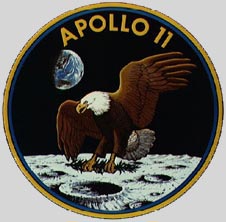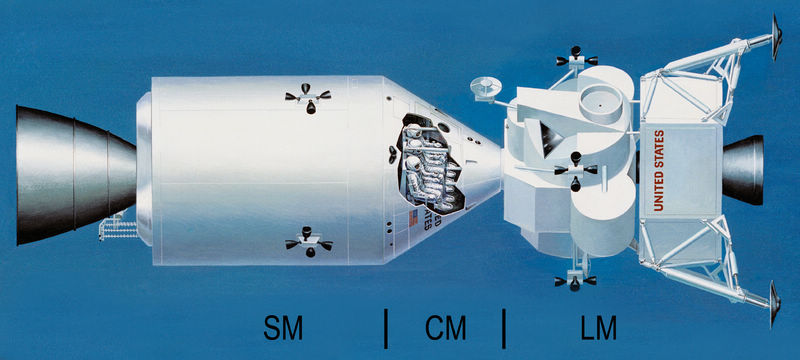

American astronaut Neil Armstrong, the first man ever to set foot on the moon, died at the age of 82 on August 25, 2012.
Best remembered by his words "That's one small step for (a) man, one giant leap for mankind," Armstrong's death shocked the world.
Armstrong, an iconic space explorer, commanded the Apollo 11 spacecraft that landed on the moon on July 20, 1969. He and his fellow astronaut Buzz Aldrin spent two and a half hours walking on the moon, collecting samples, conducting experiments and taking photographs, while astronaut Michael Collins remained in orbit in the command module.
"He served his nation proudly, as a navy fighter pilot, test pilot and astronaut," his family said.
 |
Launched by a Saturn V rocket from Kennedy Space Center in Merritt Island, Florida on July 16, Apollo 11 was the fifth manned mission of NASA's Apollo program. The Apollo spacecraft had three parts: a Command Module with a cabin for the three astronauts which was the only part which landed back on Earth; a Service Module containing propulsion, electrical power, oxygen and water; and a Lunar Module for landing on the Moon. After being sent to the Moon by the Saturn V's upper stage, the astronauts separated the spacecraft from it and travelled for three days until they entered into lunar orbit. Armstrong and Aldrin then moved into the Lunar Module and landed in the Sea of Tranquility. They stayed a total of about 21½ hours on the lunar surface, including about 2½ hours outside the spacecraft. After lifting off in the upper part of the Lunar Module and rejoining Collins in the Command Module, they returned to Earth and landed in the Pacific Ocean on July 24.
|
Born on August 5, 1930, in Wapakoneta, Ohio, Armstrong served in the US Navy and joined the Korean War before becoming an astronaut. After the war, he served as a test pilot at the National Advisory Committee for Aeronautics High Speed Flight Station.
In 1961, former Soviet Union beat the United States in the space race by sending its cosmonaut Yuri Gagarin into the outer space to complete an orbit of the Earth in April.
Under the pressure, former US President John Kennedy announced the lunar-landing mission about a month after Gagarin's space flight and set a challenging deadline for the landing, which was 1969.
Regardless of his feat in accomplishing the most daring scientific expedition of the 20th century, Armstrong remained modest and self-effacing.
He was described by his family as "a reluctant American hero who always believed he was just doing his job."
"I guess we all like to be recognized not for one piece of fireworks but for the ledger of our daily work," he said in a CBS interview.
Armstrong left NASA a year after the Apollo 11 mission to become a professor of engineering at the University of Cincinnati.
 |
|
Apollo 11 spacecraft. SM: Service Module (no call sign); CM: Command Module, Columbia; LM: Lunar Module, Eagle |
Reaction to death of Armstrong
US President Barack Obama: "Neil was among the greatest of American heroes - not just of his time, but of all time. ...
"Today, Neil's spirit of discovery lives on in all the men and women who have devoted their lives to exploring the unknown - including those who are ensuring that we reach higher and go further in space. That legacy will endure - sparked by a man who taught us the enormous power of one small step."
Edwin "Buzz" Aldrin: "We are missing a great spokesman and leader in the space program." Aldrin said he would remember Armstrong "as being a very capable commander and leader of an achievement that will be recognized until man sets foot on the planet Mars."
Michael Collins: "He was the best and I will miss him terribly."
Armstrong family: "For those who may ask what they can do to honor Neil, we have a simple request. Honor his example of service, accomplishment and modesty, and the next time you walk outside on a clear night and see the moon smiling down at you, think of Neil Armstrong and give him a wink."
Notable events in the history of human space exploration
October 4, 1957: First artificial satellite, Sputnik I, is launched by Soviet Union.
April 12, 1961: Soviet cosmonaut Yuri Gagarin completes the first manned space flight, orbiting the Earth in 108 minutes.
February 20, 1962: John Glenn becomes first American to orbit Earth, completing three orbits.
March 18, 1965: Cosmonaut Aleksei Leonov takes man's first spacewalk.
April 24, 1967: Cosmonaut Vladimir Komarov is killed when his Soyuz I spacecraft crashes on return to Earth.
July 20, 1969: Man walks on the moon. Neil Armstrong and Buzz Aldrin of Apollo XI spend 21 1/2 hours on the moon, 2 1/2 of those outside the capsule.
June 29, 1971: Three cosmonauts, Georgy Dobrovolsky, Vladislav Volkov and Viktor Patsayev, die during re-entry of their Soyuz 11 spacecraft. A government commission disclosed that the three died 30 minutes before landing because a faulty valve depressurized the spacecraft.
April 12, 1981: Shuttle Columbia becomes first winged spaceship to orbit Earth and return to airport landing.
January 28, 1986: Challenger shuttle explodes 73 seconds after launch, killing its crew of seven.
February 1, 2003: Shuttle Columbia breaks apart over Texas, 16 minutes before it was supposed to land in Florida.
July 21, 2011: Final space shuttle mission ends when Atlantis arrives at Kennedy Space Center.